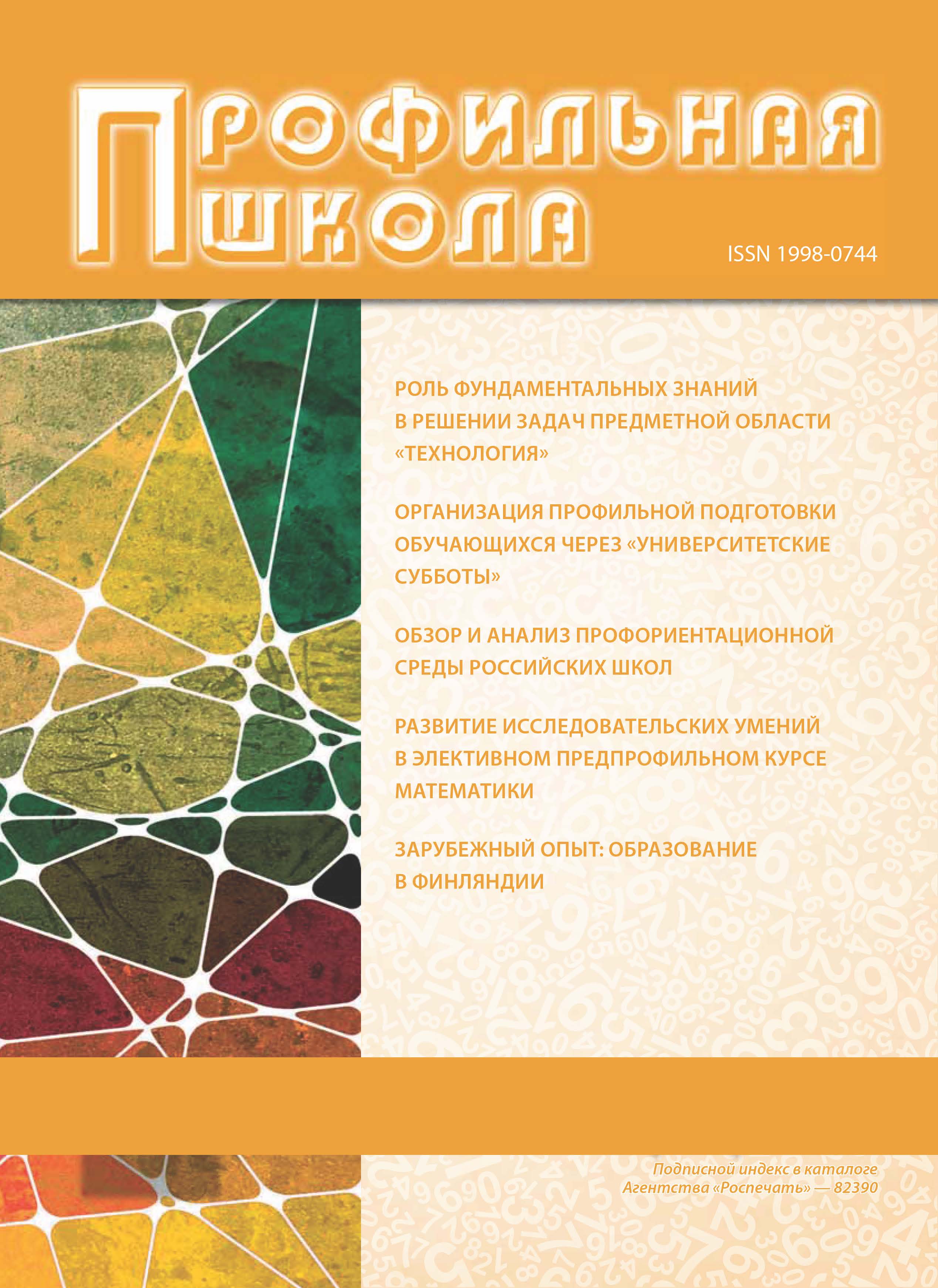Moskva, Moscow, Russian Federation
The goal of modern specialized training is to increase the human potential – the sustainable development of schoolchildren in the process of becoming professional adaptability – the ability to cope with the challenges of civilization and globalization in production activities, the active introduction of students into socio-economic life, the formation of satisfaction with the process and results of training that create a positive attitude as a factor for ensuring life success both during school education and in later life. Profiling of training is the development of programs aimed at meeting the needs of students in professional self-determination. Algorithmization of training profiling (building of educational material in a scientifically based sequence) it helps to increase the effectiveness of the educational process aimed at the formation of social and professional success of students. Scientific expertise of specialized training programs is a mechanism for managing the personal success of students in a specialized school. During the examination, an active qualitative analysis of the didactic materials and educational technologies proposed by the developer takes place, methods of their improvement are recommended. This is the activity essence of pedagogical expertise.
profiling, algorithmization of students' success, sustainable development, human potential, scientific expertise of educational programs
1. Anan'ev B.G. Psikhologiya pedagogicheskoy otsenki. Izbrannye psikhologicheskie Trudy [Psychology of Pedagogical Assessment. Selected psychological works]. Moscow: Pedagogika Publ., 1980, V. 2, pp. 130-159.
2. Bychkov A.V. Sozidatel'naya kul'tura uchashchikhsya [The creative culture of students]. Moscow: ANOO «Stupeni znaniy» Publ., 2006. 60 p. EDN: https://elibrary.ru/QVBLZZ
3. Bychkov A.V. Akmeologicheskie tsennosti «pokoleniya Z» v predprofil'nom obuchenii «tekhnologii» i v kolledzhe [Acmeological values of "generation Z" in pre-profile teaching "technology" and in college]. Profil'naya shkola [Profile school]. 2018, V. 6, I. 5, pp. 35-42. DOI: https://doi.org/10.12737/article_5bbf083d0398f8.25379230; EDN: https://elibrary.ru/YLLDTF
4. Bychkov A.V. Metod proektov v sovremennoy shkole [The method of projects in the modern school]. Moscow: ABV-IZDAT Publ., 2018. 100 p. EDN: https://elibrary.ru/SCRZUU
5. Bychkov A.V. Nauchnyy potentsial pedagoga: v profil'noy shkole i v kolledzhe [The scientific potential of the teacher: in the profile school and in the college]. Profil'naya shkola [Profile school]. 2020, I. 4, pp. 7-13. DOI: https://doi.org/10.12737/1998-0744-2020-7-13; EDN: https://elibrary.ru/JYIMGW
6. Klimov E.A. Psikhologiya professional'nogo samoopredeleniya [Psychology of professional self-determination]. Moscow: «Akademiya» Publ., 2004. 304 p. EDN: https://elibrary.ru/QXIENF
7. Razvitie i mezhdunarodnoe ekonomicheskoe sotrudnichestvo: problemy okruzhayushchey sredy [Development and international economic cooperation: environmental problems]. Doklad Vsemirnoy komissii po voprosam okruzhayushchey sredy i razvitiya. OON. General'naya Assambleya. A/42/427 [Report of the World Commission on Environment and Development. UN. General Assembly. A / 42/427. 4 August 1987. RUSSIAN. page 24].
8. Kharash A.U. Gumanitarnaya ekspertiza v ekstremal'nykh situatsiyakh: ideologiya, metodologiya, protsedura [Humanitarian expertise in extreme situations: ideology, methodology, procedure]. Vvedenie v prakticheskuyu sotsial'nuyu psikhologiyu [Introduction to practical social psychology]. Moscow, 1996, p. 114.
9. Fieger Peter. Measuring student satisfaction from the Student Outcomes Survey. National Centre for Vocational Education Research Technical Paper. Commonwealth of Australia, 2012, p. 7.
10. Lawler, Patricia A. The Challenges of the Future: Ethical Issues in a Changing Student Population. Widener University Chester. ERIC. 1991, p.4. № 16. Paul S. Szwed. Expert Judgment in Project Management: Narrowing the Theory-Practice Gap. Project Management Institute. 2016, p. 4.
11. Paul S. Szwed. Expert Judgment in Project Management: Narrowing the Theory-Practice Gap. Project Management Institute. 2016, p. 33-34.
12. What Matters to Student Success: A Review of the Literature. Sommissioned Report for the National Symposium on Postsecondary Student Success: Spearheading a Dialog on Student Success. George D. Kuh, Jillian Kinzie, Jennifer A. Buckley. Indiana University Bloomington Brian K. Bridges. American Council on Education John C. Hayek. Kentucky Council on Postsecondary Education. NPEC. July 2006, p. 14.






